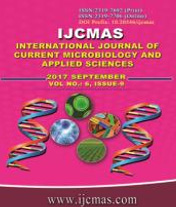


 National Academy of Agricultural Sciences (NAAS)
National Academy of Agricultural Sciences (NAAS)

|
PRINT ISSN : 2319-7692
Online ISSN : 2319-7706 Issues : 12 per year Publisher : Excellent Publishers Email : editorijcmas@gmail.com / submit@ijcmas.com Editor-in-chief: Dr.M.Prakash Index Copernicus ICV 2018: 95.39 NAAS RATING 2020: 5.38 |
A survey was conducted in the niche areas of muskmelon and found that hybrids Bobby and Muskan were suitable for long distant transportation. 30 fruits each of Bobby and Muskan hybrids were obtained from farmer’s field to carry out this experiment in the Krishi Vigyan Kendra, Kapurthala laboratory during the months of May-June, 2017. This experiment was carried out for 5 days keeping in view the maximum and after a gap of 24 hr, two muskmelon fruits each from all three treatments were weighed, cut and measured for different parameters daily for consecutive 5 days. The data revealed that fruit weight of Muskan on 3rd day (0.949 g) was at par with initial harvest weight of Bobby (0.933 g) revealing that initial weight of fruit had its impact else ripening agent had no impact on variation in fruit weight. TSS of Muskan on 3rd day (12.217 oBrix) was at par with Bobby on 1st day (12.4317 oBrix), although on 5th day in Muskan, the TSS was significantly higher than Bobby on 1st day, thus, genetic makeup of hybrid plays major role in increasing TSS than ripening agents. pH in case of Bobby increased by 18.4 per cent and 14.8 per cent for Muskan with the passage of time. The pH value was maximum for both the hybrids with calcium carbide, at par with Ethephone and statistically higher than control in both the hybrids. In fruit diameter decrease was gradual with the duration but its impact was more on Muskan than Bobby, which might be due to initial higher fruit diameter of the fruit. It can be concluded that muskmelon fruits can be ripened naturally at room temperature during the months of May-June as the day temperature exists between 40 to 45o C and there is no need to make use of any ripening agent while transporting the fruit to the distant markets.
 |
 |
 |
 |
 |